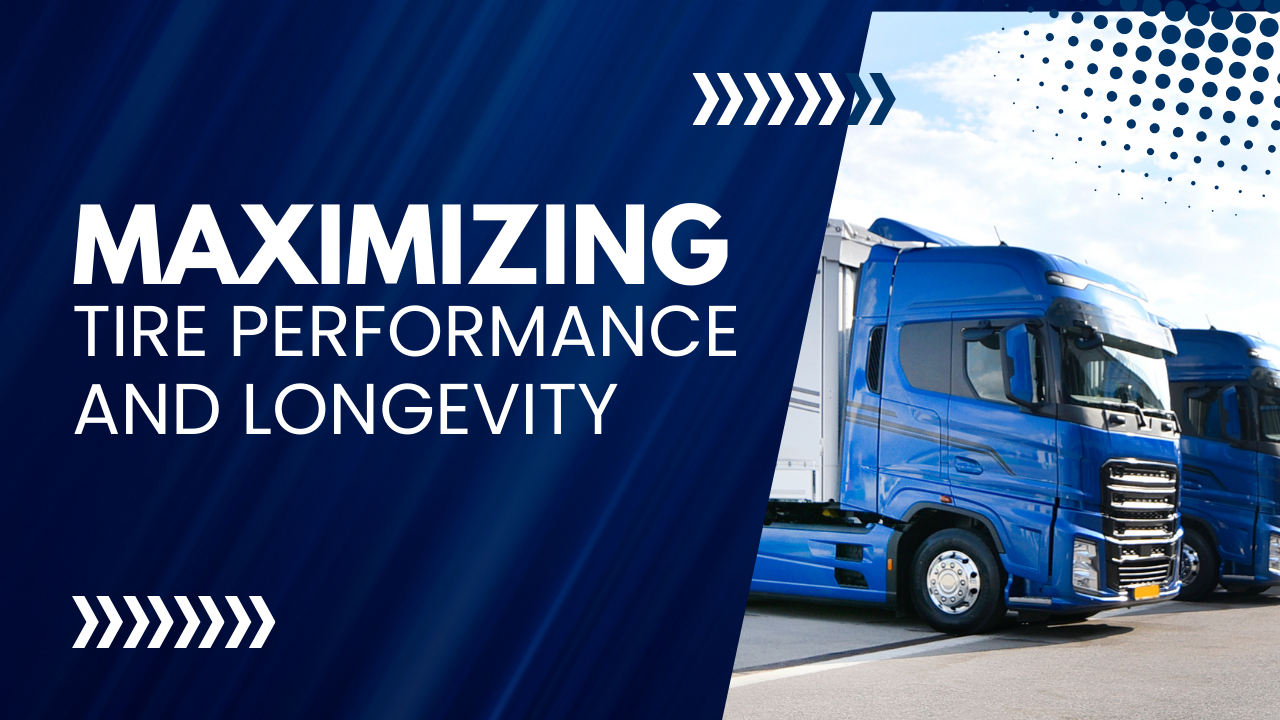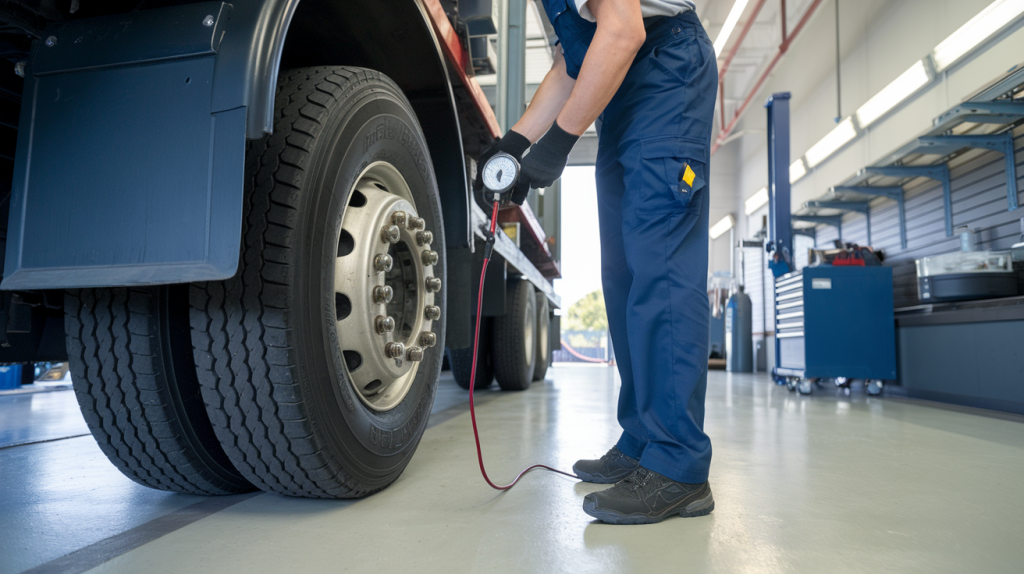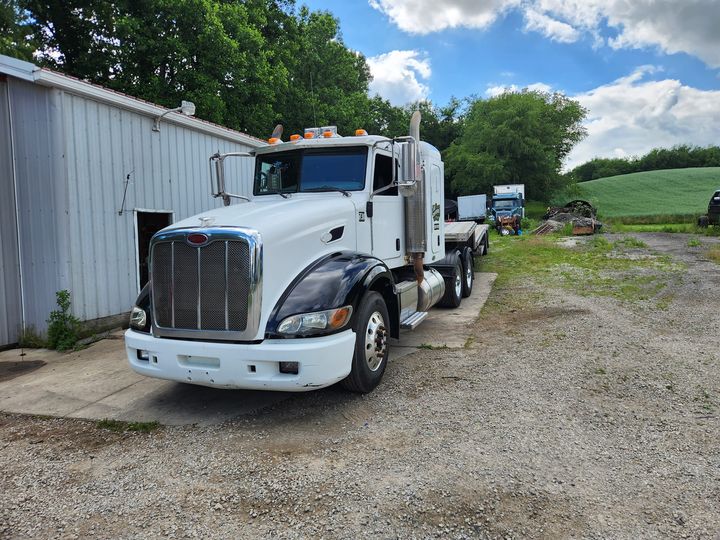
Maximizing tire performance is essential for the safety, efficiency, and cost-effectiveness of your fleet. Proper tire care not only extends the life of your tires but also improves fuel efficiency and vehicle handling. In this article, we’ll cover the key practices that help you get the most out of your tires, ensuring they perform well and last as long as possible.
1. Importance of Proper Tire Inflation
Maintaining the correct tire pressure is crucial for preventing uneven wear, improving fuel efficiency, and enhancing safety. Overinflated or underinflated tires can lead to uneven tread wear, reduced traction, and an increased risk of blowouts. Regularly checking and adjusting tire pressure to the manufacturer’s recommended levels is a simple yet effective way to extend tire life.

2. Regular Tire Rotation
Rotating your tires regularly ensures even wear across all tires, which extends their lifespan. Depending on your vehicle and driving habits, you should rotate your tires every 5,000 to 8,000 miles. Consider cross-rotation (moving tires from front to back and side to side) or front-to-back rotation, depending on the wear patterns you observe. This practice helps maintain consistent traction and prevents premature tire replacement.
3. Alignment and Balance Checks
Proper alignment and balance are critical for preventing uneven tire wear and improving vehicle handling. Misalignment can cause tires to wear unevenly, reducing their lifespan and affecting your vehicle’s stability. Routine alignment checks, especially after hitting a pothole or curb, help ensure your tires wear evenly. Additionally, balancing your tires reduces vibration, improving ride comfort and extending tire life.
4. Monitoring Tire Tread Depth
Adequate tread depth is essential for maintaining traction, particularly in wet or icy conditions. Worn-out tread can lead to skidding and longer stopping distances. Regularly check your tire tread depth using a tread depth gauge or the penny test. If the tread is worn down to 2/32 of an inch or less, it’s time to replace the tire to ensure safe driving conditions.

5. Avoiding Overloading
Overloading your vehicle can lead to excessive tire wear, reduced fuel efficiency, and an increased risk of tire failure. Every tire has a load rating that indicates the maximum weight it can safely carry. Exceeding this limit puts undue stress on the tires, causing them to wear out faster and increasing the likelihood of a blowout. Always check your vehicle’s load ratings and avoid overloading to protect your tires and ensure safe driving.
6. Choosing the Right Tires for Your Vehicle
Selecting the correct tires for your vehicle and driving conditions is crucial for maximizing performance and longevity. Consider factors such as tire type, size, and seasonal requirements when choosing tires. Consulting your vehicle’s manual and seeking professional advice can help you make the best choice, ensuring your tires perform optimally and last longer.
7. Regular Inspections for Damage
Routine inspections for cuts, punctures, and other damage are essential to maintaining tire integrity. Small damages can quickly become major issues if left unchecked. Inspect your tires during routine maintenance and before long trips to catch any problems early. This proactive approach helps prevent blowouts and ensures your tires remain in good condition.
8. Proper Storage of Tires
How you store your tires when they’re not in use can significantly impact their lifespan. Improper storage can lead to tire degradation, cracking, or flat-spotting. Store tires in a cool, dry place, away from direct sunlight and sources of heat. If possible, keep them off the ground and consider covering them to protect against dust and debris.
9. Investing in Quality Tires
While it might be tempting to cut costs by purchasing cheaper tires, investing in high-quality tires can save you money in the long run. Quality tires offer better performance, longer life, and enhanced safety, reducing the frequency of replacements and the risk of accidents. Consider the long-term benefits of quality tires when making purchasing decisions.
Proper tire maintenance is key to maximizing performance, extending tire lifespan, and ensuring the safety of your fleet. By maintaining proper inflation, rotating your tires regularly, checking alignment and balance, and avoiding overloading, you can significantly extend the life of your tires and improve vehicle efficiency. Regular inspections and choosing the right tires for your fleet are also crucial steps in maintaining optimal tire performance. Investing in quality tires and storing them properly will further enhance their longevity. Implement these practices to keep your fleet on the road safely and efficiently.
Ready to get the most out of your tires? Contact A1 Tire today to explore our range of high-quality tires and professional maintenance services. Let us help you maximize tire performance and keep your fleet in top condition.


